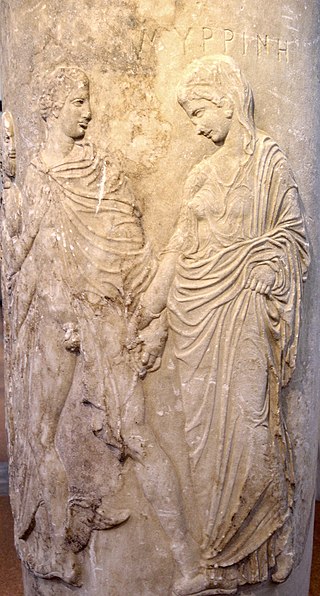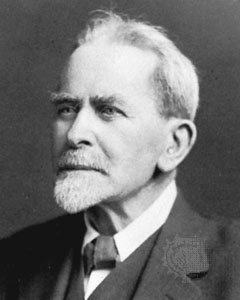Related Research Articles

A demon is a malevolent supernatural entity. Historically, belief in demons, or stories about demons, occurs in folklore, mythology, religion, and literature; these beliefs are reflected in media including comics, fiction, film, television, and video games. Belief in demons probably goes back to the Paleolithic age, stemming from humanity's fear of the unknown, the strange and the horrific. In ancient Near Eastern religions and in the Abrahamic religions, including early Judaism and ancient-medieval Christian demonology, a demon is considered a harmful spiritual entity that may cause demonic possession, calling for an exorcism. Large portions of Jewish demonology, a key influence on Christianity and Islam, originated from a later form of Zoroastrianism, and was transferred to Judaism during the Persian era.

In folklore, a ghost is the soul or spirit of a dead person or non-human animal that is believed to be able to appear to the living. In ghostlore, descriptions of ghosts vary widely, from an invisible presence to translucent or barely visible wispy shapes to realistic, lifelike forms. The deliberate attempt to contact the spirit of a deceased person is known as necromancy, or in spiritism as a séance. Other terms associated with it are apparition, haunt, haint, phantom, poltergeist, shade, specter, spirit, spook, wraith, demon, and ghoul.

Samhain, Sauin or Oíche Shamhna is a Gaelic festival on 1 November marking the end of the harvest season and beginning of winter or "darker half" of the year. It is also the Irish language name for November. Celebrations begin on the evening of 31 October, since the Celtic day began and ended at sunset. This is about halfway between the autumnal equinox and winter solstice. It is one of the four Gaelic seasonal festivals along with Imbolc, Bealtaine, and Lughnasa. Historically it was widely observed throughout Ireland, Scotland, and the Isle of Man. A similar festival is held by the Brittonic Celtic people, called Calan Gaeaf in Wales.

Supernatural refers to phenomena or entities that are beyond the laws of nature. The term is derived from Medieval Latin supernaturalis, from Latin super- + natura (nature). Although the corollary term "nature" has had multiple meanings since the ancient world, the term "supernatural" emerged in the Middle Ages and did not exist in the ancient world.

Psychopomps are creatures, spirits, angels, demons, or deities in many religions whose responsibility is to escort newly deceased souls from Earth to the afterlife.
Dinka spirituality is the traditional religion of the Dinka people, an ethnic group of South Sudan. They belong to the Nilotic peoples, which is a group of cultures in Southern Sudan and wider Eastern Africa. The Dinka people largely rejected or ignored Islamic teachings, as Abrahamic religious beliefs were incompatible with their society, culture and traditional beliefs.
The Lugbara live in the Democratic Republic of the Congo, Uganda , and South Sudan. Their number totaled approximately 240,000, with around 180,000 residing in north-western Uganda, with the remaining population spread across bordering areas of the modern-day Democratic Republic of Congo and South Sudan. The Lugbara people speak in a Sudanese language. The basic social and economic unit found in Lugbara culture is a lineage group under the authority of a male genealogical elder called ba wara, meaning "big man". These lineage groups, often referred to as sub-tribes, typically lived in a village built atop a hillside or ridge. In addition to the male elder, other religious leaders include diviners, oracles, and rain men.
The Tumbuka are an ethnic group living in Malawi, Zambia, and Tanzania. In Tumbuka mythology, Chiuta is the Supreme Creator and is symbolised in the sky by the rainbow.
Demonology is the study of demons within religious belief and myth. Depending on context, it can refer to studies within theology, religious doctrine, or occultism. In many faiths, it concerns the study of a hierarchy of demons. Demons may be nonhuman, separable souls, or discarnate spirits which have never inhabited a body. A sharp distinction is often drawn between these two classes, notably by the Melanesians, several African groups, and others. The Islamic jinn, for example, are not reducible to modified human souls. At the same time these classes are frequently conceived as producing identical results, e.g. diseases.

Sir James George Frazer was a Scottish social anthropologist and folklorist influential in the early stages of the modern studies of mythology and comparative religion.
Adroa is the supreme god or spirit of the Lugbara people of central Africa.

The Ancient Greek: δαίμων, pronounced daimon or daemon, originally referred to a lesser deity or guiding spirit such as the daimons of ancient Greek religion and mythology and of later Hellenistic religion and philosophy. The word is derived from Proto-Indo-European daimon "provider, divider ," from the root *da- "to divide". Daimons were possibly seen as the souls of men of the golden age acting as tutelary deities, according to entry δαίμων at Liddell & Scott. See also daimonic: a religious, philosophical, literary and psychological concept.

The beliefs and practices of African people are highly diverse, including various ethnic religions. Generally, these traditions are oral rather than scriptural and are passed down from one generation to another through folk tales, songs, and festivals, and include beliefs in spirits and higher and lower gods, sometimes including a supreme being, as well as the veneration of the dead, and use of magic and traditional African medicine. Most religions can be described as animistic with various polytheistic and pantheistic aspects. The role of humanity is generally seen as one of harmonizing nature with the supernatural.

Akan religion comprises the traditional beliefs and religious practices of the Akan people of Ghana and eastern Ivory Coast. Akan religion is referred to as Akom. Although most Akan people have identified as Christians since the early 20th century, Akan religion remains practiced by some and is often syncretized with Christianity. The Akan have many subgroups, so the religion varies greatly by region and subgroup. Similar to other traditional religions of West and Central Africa such as West African Vodun, Yoruba religion, or Odinani, Akan cosmology consists of a senior god who generally does not interact with humans and many gods who assist humans.

Bantu religion is the system of beliefs and legends of the Bantu people of Africa. Although Bantu peoples account for several hundred different ethnic groups, there is a high degree of homogeneity in Bantu cultures and customs, just as in Bantu languages. Many Bantu cultures traditionally believed in a supreme god whose name is a variation of Nyambe/Nzambe.

West African mythology is the body of myths of the people of West Africa. It consists of tales of various deities, beings, legendary creatures, heroes and folktales from various ethnic groups. Some of these myths traveled across the Atlantic during the period of the Trans-Atlantic slave trade to become part of Caribbean, African-American and Brazilian mythology.

A deity or god is a supernatural being considered to be sacred and worthy of worship due to having authority over the universe, nature or human life. The Oxford Dictionary of English defines deity as a god or goddess, or anything revered as divine. C. Scott Littleton defines a deity as "a being with powers greater than those of ordinary humans, but who interacts with humans, positively or negatively, in ways that carry humans to new levels of consciousness, beyond the grounded preoccupations of ordinary life".

Kongo religion encompasses the traditional beliefs of the Bakongo people. Due to the highly centralized position of the Kingdom of Kongo, its leaders were able to influence much of the traditional religious practices across the Congo Basin. As a result, many other ethnic groups and kingdoms in West-Central Africa, like the Chokwe and Mbundu, adopted elements of Bakongo spirituality.
Gborogboro and Meme were twins and the first man and woman in Lugbara mythology.
References
- 1 2 3 Robert S. Ellwood (1977). Words of the World's Religions: An Anthology. Prentice-Hall. pp. 42–44. ISBN 978-0-13-965004-8.
- 1 2 Patricia Ann Lynch (1 January 2004). African Mythology A to Z. Infobase Publishing. p. 4. ISBN 978-1-4381-1988-5.
- 1 2 Josepha Sherman (26 March 2015). Storytelling: An Encyclopedia of Mythology and Folklore. Taylor & Francis. ISBN 978-1-317-45937-8.
- ↑ Evan M. Zuesse (1979). Ritual Cosmos: The Sanctification of Life in African Religions. Ohio University Press. p. 214. ISBN 978-0-8214-0398-3.
- 1 2 "Adroa - Oxford Reference". Oxford Reference . Oxford University Press. Archived from the original on 2020-05-20. Retrieved 2020-05-20.
- 1 2 Douglas Thomas; Temilola Alanamu (31 December 2018). African Religions: Beliefs and Practices through History. ABC-CLIO. p. 8. ISBN 978-1-61069-752-1.
- ↑ J. A. Coleman (2007). The Dictionary of Mythology: An A-Z of Themes, Legends and Heroes. Arcturus. p. 22. ISBN 978-0-572-03222-7.